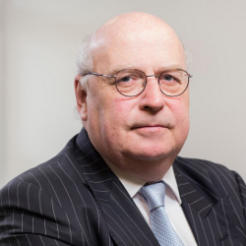Sir Stuart Etherington, chief executive of NCVO, will convene a meeting of banks to discuss problems that some Muslim charities face with their accounts.
A number of Muslim charities have had their bank accounts unexpectedly closed recently. Following a meeting with representatives from Muslim charities, NCVO will be arranging a meeting of banks to discuss the problems that have led to those closures.
Elizabeth Chamberlain, policy manager at NCVO, said banks have been left in a difficult position with regard to some charities operating overseas.
She said they faced problems due to the requirements of tight regulations designed to avoid money laundering, along with the additional risk generated consequent to growing Middle East conflicts.
“We understand banks may sometimes find it simpler to end relationships with customers rather than carry out the complex compliance work required to satisfy themselves that their risks are at a satisfactory level," she said.
"However we hope that by getting banks and charities together we can work towards solutions that go as far as possible to minimise the likelihood of consequences for charities.”
Last Wednesday, Etherington (pictured) met with Shuaib Yusuf, assistant chief executive of Muslim Aid, Shahid Bashir, assistant chief executive of Muslim Hands, and Abdurahman Sharif, operations manager of the Muslims Charities Forum.
NCVO anticipates working with banks, government and Muslim charity representatives, and international development charity bodies. It is hoping to come up with “practical solutions” for banks and charities to see how recent problems can be avoided.
Sharif told Civil Society News that he hopes that these issues will be directly addressed with the Charity Commission.
Commission investigations also an issue
At the meeting the charity representatives also raised some concerns about the Charity Commission’s approach to investigations and to naming charities.
They said that they are concerned that their charity’s reputations could be harmed as a result of the current approach and Etherington has agreed to have talks with the Commission about their concerns.
A spokesman from NCVO said that the organisation believes that there could be some value in discussions about what information the Charity Commission publishes when they open and close inquiries.
He said that the Commission needs to find the right balance in publishing information that allows the public to have some indication about the nature and scale of concerns about a charity while ensuring effective investigations. This will then show whether the inquiry is focused on concerns that are “widespread or fundamental” or “isolated to a small area of operation”.
The spokesman said: “We are interested in the time that inquiries are taking and we’re raising that with the Commission. We think announcing the start of an investigation is welcome as it shows that the Commission is being an active regulator. It will help sustain public confidence in charities if it’s clear that they are well regulated.
“However in the interests of fairness to the charity under investigation, it’s crucial that investigations are conducted as speedily as possible. As we’ve said previously, we would like the Commission to publish regular indicators of how long its investigations are taking.”
The Muslim Charities Forum said: “We would like the investigations to be more detailed and specific rather than general. To specify more when inquiries are done, why are they being made and give the details, rather than talking in general terms.”









